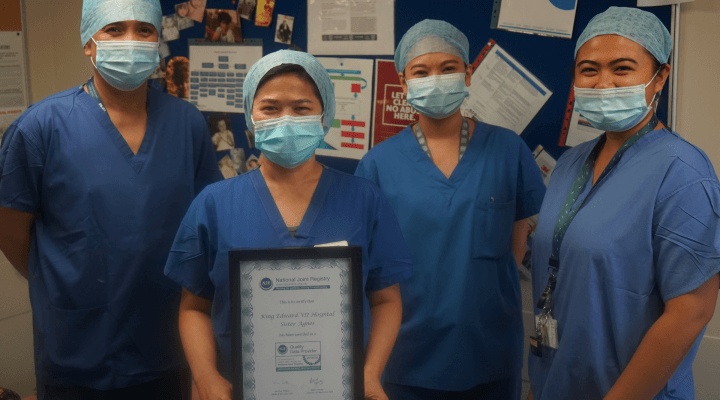News
King Edward VII’s Hospital named National Joint Registry Quality Data Provider

King Edward VII’s Hospital is delighted to have been named as a National Joint Registry (NJR) Quality Data Provider after successfully completing a national programme of local data audits.
The NJR monitors the performance of hip, knee, ankle, elbow and shoulder joint replacement operations to improve clinical outcomes for the benefit of patients, clinicians and industry. The registry collects high quality orthopaedic data in order to provide evidence to support patient safety, standards in quality of care, and overall cost effectiveness in joint replacement surgery.
The ‘NJR Quality Data Provider’ certificate scheme was introduced to offer hospitals a blueprint for reaching high quality standards relating to patient safety and reward those who have met registry targets in this area. In order to achieve the award, hospitals are required to meet a series of six ambitious targets during the audit period 2019/20.
Following the hard work and dedication of the Theatres and Ward teams, lead by Jean Salmorin (Orthopaedic Team Leader), King Edward VII’s Hospital is delighted to be acknowledged for the high standards of patient safety as set out by the NJR.
Tonya Kloppers, Director of Nursing/ Matron, said “Improving patient safety is of the upmost importance and something all staff take very seriously. We’re very proud of our team for achieving this recognition of excellent working practices and their commitment to our values. We fully support the National Joint Registry’s work in facilitating improvement in clinical outcomes and governance for the benefit of joint replacement patients and we’re delighted to be awarded as an ‘NJR Quality Data Provider.”
National Joint Registry Medical Director, Mr Tim Wilton, said “Congratulations to colleagues at King Edward VII’s Hospital. The Quality Data Provider Award demonstrates the high standards being met towards ensuring compliance with the NJR and is often a reflection of strong departmental efforts to achieve such status. Registry data now provides an important source of evidence for regulators, such as the Care Quality Commission, to inform their judgements about services, as well as being a fundamental driver to inform improved quality of care for patients.”
Image (left to right): Angelee Otic, Issa Paguidopon, Jean Salmorin, Sam Vargas
Latest Hospital News
Should you wish to speak to our press team, please visit Press Enquiries



